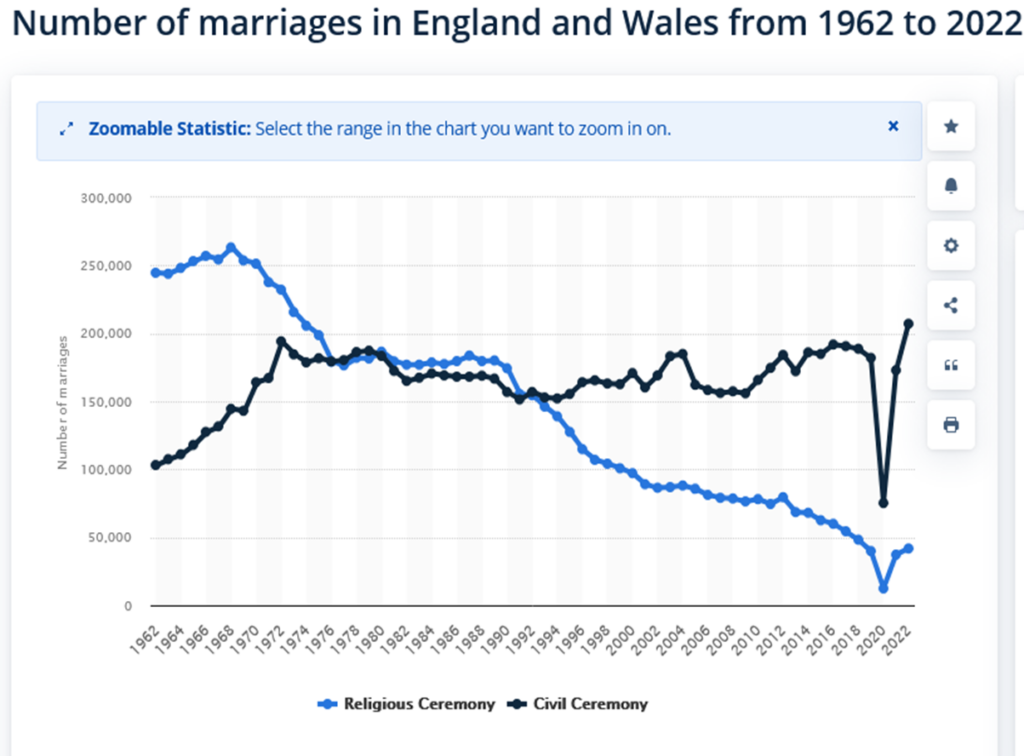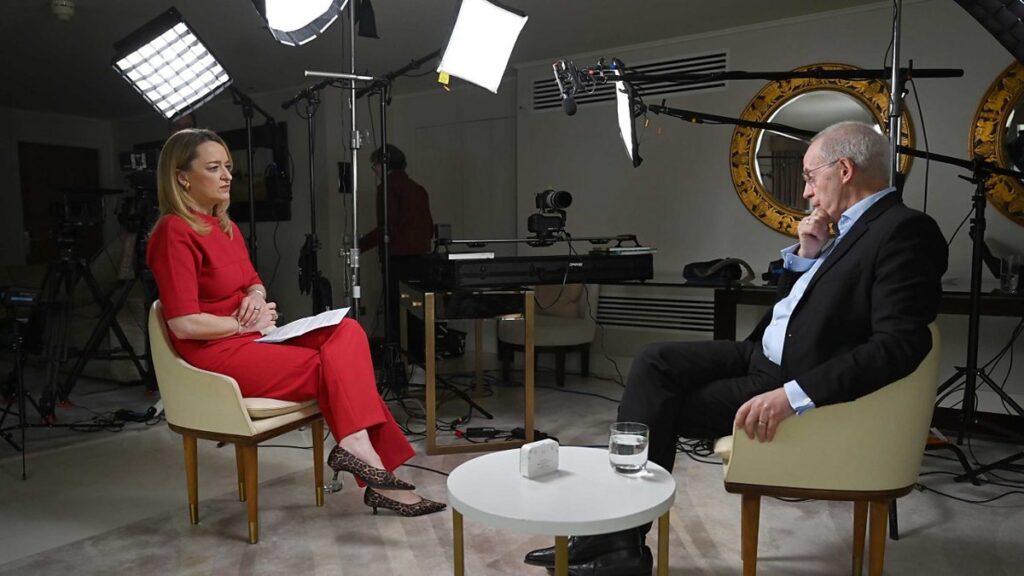by Martyn Percy

Source: https://www.statista.com/statistics/369115/marriages-in-england-and-wales-by-type-of-ceremony/
We, as a nation, have now passed the fifth anniversary of Covid-19. Stay at home. Avoid meeting others. Churches locked. Bishops conducting online services from their kitchens, ritually sanitising their hands (even though nobody was communicated). Dominic Cummings driving to Barnard Castle for some reason or other. Funerals restricted to a handful of mourners. People dying in care homes, with loved ones only able to press their noses against the window in those final hours. The Prime Minister being admitted to hospital and coming close to death. The daily ritual of banging pots and pans for the NHS, arguably the national secular-sacred faith of the realm.
We all have memories of Covid-19 and the two periods of lockdown, punctuated by “eat out to help out”. But as a recent op-ed in The Economist noted,
“Coronavirus in Britain is a story of individual grief and collective amnesia. The fifth-anniversary commemorations on March 9th, which had been designated a “Day of Reflection” by the government, were dignified but modest. In London relatives of the deceased threw carnations into the Thames, as a piper played a lament. Around them, joggers plodded, tourists gawped and drinkers toasted the first pint of the day in glorious spring sunshine. This is a sentimental country, where Armistice commemorations seem to grow bigger each year and new statues are erected to local heroes. But mention the pandemic, the biggest calamity in living memory, and you will be met by a wince and a change of subject. The memory is less of the neighbourliness and Zoom yoga, more of bitterness and boredom…”
A BBC Survey published on 25 March 2025 estimates that as many as 1:10 may have Long-Covid. That’s around 5.5 million in England alone (https://www.bbc.co.uk/news/articles/c93ker0kevpo). Long-Covid is a new condition which is still being studied. The most common symptoms of Long-Covid include fatigue, difficulty breathing, problems with concentration and memory, aches and pains. Other symptoms include disruption to senses (i.e., such as smell, hearing, taste, etc.), chest pains, difficulty sleeping (insomnia), depression and anxiety, feeling sick, loss of appetite and persistent headaches.
Of course, the CofE does not have an illness like this. Not in reality. Here we are speaking only analogically, and in so doing, I draw on David Tracy and his prescient The Analogical Imagination (1981). Analogically, the CofE is a corporate body with severe malaise, and is experiencing symptoms it cannot make sense of. But what are the underlying causes?
A number of senior clergy have opined that a lot of the struggles the CofE is currently wrestling with have been pinned on to Covid-19. Other senior clergy have expressed scepticism on this, and suspect that Covid-19 has become a distraction for not thinking about the deeper latent problems that were bound to pose issues to the CofE, and eventually become manifest.
I think they are both right. But to understand why the CofE can’t cope with its (corporate, analogical) Long-Covid, one has to look further back.
In their remarkable book Secular Cycles (Princeton UP, 2009) Peter Turchin and Sergey Nefedov show how societies in Europe evolve and adapt to the bigger underlying cultural, political, demographic templates that shape life, hope, expectations and outcomes. They show, amongst other things, how birth rates, food prices and inflation shape population size. How inflation and stagflation (i.e., the combination of high inflation, stagnant economic growth, and elevated unemployment) impact wages, employment and work. And disease, plague, wars, revolts and natural disasters must also be factored in.
Many historical processes exhibit recurrent patterns of change. Century-long periods of population expansion come before long periods of stagnation and decline; the dynamics of prices mirror population oscillations; and states go through strong expansionist phases followed by periods of state failure, endemic sociopolitical instability, and territorial loss. Turchin and Nefedov explore the dynamics and causal connections between such demographic, economic, and political variables in agrarian societies and offer detailed explanations for these long-term oscillations–what the authors call secular cycles.
Secular Cycles elaborates and expands upon the demographic-structural theory first advanced by Jack Goldstone, which provides an explanation of long-term oscillations. Turchin and Nefedov test that theory’s specific and quantitative predictions by tracing the dynamics of population numbers, prices and real wages, elite numbers and incomes, state finances, and sociopolitical instability. Incorporating theoretical and quantitative history, the book studies societies in Europe during the medieval and early modern periods, and even looks back at the Roman Republic and Empire.
Turchin and Nefedov don’t have much to say about Christianity directly, but it is clear that when one analyses the big social-secular-material cycles, churches are compelled to adapt. As they do so, they incur the consequential symptoms that the larger secular cycles produce. In this regard, Turchin and Nefedov follow earlier work by John R. Moorman, Jack Goldstone and Lawrence Stone
For example, Medieval England had around 10,000 parishes serving three million people. The late medieval parish priest was a semi-literate rural worker. In pre-Tudor England hardly any parish had a resident curate, or even necessarily a parish church. But 1540-1560 saw huge declines in ordinations.
Given the turbulence and violence of the Reformation this is hardly a surprise. In Canterbury diocese in 1560, of 270 livings, 107 had no clergy. In Oxford archdeaconry the numbers of clergy fell – from 371 in 1526 to 270 by 1586.
After 1600 the numbers of clergy in the CofE increased rapidly, and by 1640 there were more clergy than livings (so unemployment). By 1688 there were 10,000 clergy. But the rise and fall in numbers does not tell the whole the story. By the end of the Caroline period, a minister had a university degree, strong religious convictions, a comfortable house, and income on a par with doctors or lawyers, often able to afford domestic help. Ordination was for elites.
This trend continued, albeit in slow decline, during the 19th century, and to some extent the first half of the 20th century. But the post-war years have seen a much, much steeper decline in the public status and professional identity of clergy. Teachers and nurses will be better-paid, and enjoy stronger employment rights.
Today there are 12,500 parishes in the CofE serving a population of 57 million. Under 700,000 attend its services, amounting to just over 1% of the population. With 36% of attendees over the age of 70, the cliff edge looks very steep, with 200,000 set to be lost to the CofE in the next 15 years. They will not be replaced.
With around 50% currently aged between 18 and 69, and only 18% being 17 or younger, the CofE has largely lost its transmission rights. When empires or societies collapse, there is loss or disruption in transmission. What was previously assumed is forgotten. What was once known is no longer learned.
Between 2009 and 2019 the average weekly church attendance for the Church of England fell by approximately 218,000. Church attendance figures fell even more during 2020 and 2021, although this was due to the Covid-19 pandemic. Check the collection plate, in the meantime.
In 2022, approximately 207,004 marriages took place via a civil ceremony in England and Wales, compared with 41,915 religious ceremonies. Since 1992, there have been more civil ceremonies in every year than religious ones. Naturally, there were far fewer ceremonies taking place in 2020 due to Covid. Yet there is no national or diocesan mission strategy, nor even a bishop, getting to grips with any of this. By 2030, the average weekly church attendance for the CofE will have collapsed to around 0.5 million – simply not a sustainable economic position.
That the CofE sits on social and cultural templates it cannot control is hardly news. But there are no national or diocesan mission strategies that show any inklings for engaging with the bigger picture. The CofE thinks it is running out of young people (true). So it pours huge amounts of money, resources and anxiety into reversing this, without ever pausing to consider declining birth rates (there are fewer young people), and that as a population the English are getting older and older, with fewer taxpayers and people at work to pay for the long-term care of the elderly. Young people are extremely anxious about this, and the toll on their mental health and morale is enormous.
The CofE is habitually between 25-50 years behind the times on management, communications, leadership, HR and the like. Initiatives on mission, youth, the elderly, reorganisation, finances, governance, employment and engagement are wincingly out of date, even pre-publication. On safeguarding and sexuality the CofE occupies top spot as a national scandal (and were it not, it would be a national joke). Little of the operational and managerial infrastructure is fit for purpose. The CofE is run by (proverbial) generals fighting the wars and opponents of bygone eras, if not centuries.
On pensions, the recent letter from 700 CofE clergy flagging existential anxiety and poverty has been met with indifference by the hierarchy. As indices of trust are measured across professions, the CofE and its leadership have logged the lowest score on record. People outside the CofE do not believe what bishops say. Inside the CofE, it is hardly any better. Its managers and leaders are out of their depth, yet regard themselves as indispensable, despite being clueless. Locally, for parishes, the annual warmth of seasonal spiritual nostalgia has become a threadbare comfort blanket now so fragile it can barely be touched before being carefully stowed away until the next Christmas or Easter comes.
Meanwhile, theological analysis – which could have been be critical, nourishing and prescient in such a crisis – has been stripped out and marginalised, or ostracised by the CofE’s leadership. Whilst insights from secular social sciences were never really engaged with by the CofE leadership. Corporately, the CofE is like the proverbial frog in boiling water. It has no idea how it got into the kettle, let alone why the water is getting warmer. Alpha Courses, Fresh Expressions, mission statements and another diocesan reorganisation have been, predictably, about as effective as a nosegay in the face of a major plague epidemic.
England was hit hard by Covid as was the CofE. There were 120 days of lockdown in the nation – far more than other countries. Yet our mortality rates were amongst the highest in Europe. It is estimated that the backlog for NHS treatment is still running north of 7 million.
Pupil absence rates in schools remain high, and the bill for the bail-out given to employers and employees (one of the most generous, globally) will sit on the national debt for generations to come. The furlough scheme cost the nation £70bn, which is 2.9% of GDP.
On the ground, locally, rates of stress and anxiety amongst clergy continue to climb, and major issues on morale, mental health, expectations on work, finances (personal and ecclesial), public trust, employment rights and pensions remain unaddressed. Such factors are dogged by other persistent scandals in the church. The nation continues to practice slow-but-ever-increasing social-distancing from the CofE, save for a few festive occasions each year. Nationally, there is no sign of anyone in the CofE leadership grasping these nettles.
As I have recently argued(The Exiled Church: Reckoning with Secular Culture, Canterbury Press), the huge and calamitous adjustments made by the Church of Scotland to its demographic and financial crises could serve as a warning to other denominations on the perils of not thinking ahead. Five years on, Covid has irreversibly transformed the English nation. Which makes it all the more remarkable is that in the CofE, it seems to barely changed or adjusted at all.
So, what about the CofE suffering from a case of corporate Long-Covid? It seems to fit with our collective sense of symptoms. That said, and as Turchin and Nefedov suggest, issues that the English nation (and thus its national church) are wrestling with lie well beyond its control. It remains to be seen if the CofE leadership can read the signs of the times and interpret them, let alone think creatively about the survival and shape of the church over the next few decades.
If there is to be any hope, there must first of all be some realism about the present and future. But the leadership cannot talk their way out the collective crises afflicting the CofE. So we need a lot more show and a lot less tell. We need the leadership to show visible, serious signs of real change that are intelligent, wise and considered. On that, we continue to hold our breath. I fear we’ll be waiting for some time.








